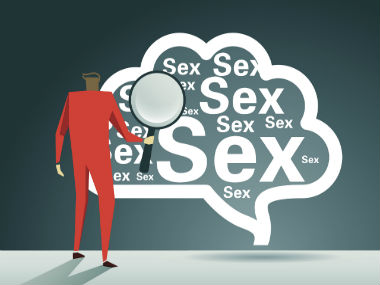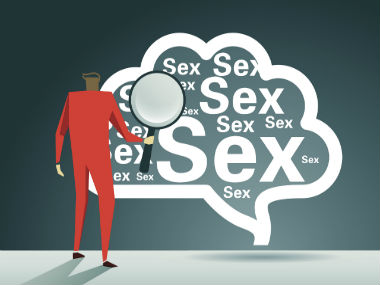Addiction — whether it is to drugs or gambling or sex — alters the brain chemistry. That’s why someone who’s dependent on a substance or behaviour continues to indulge in it even as it threatens their way of life. Until recently, the World Health Organization’s (WHO’s) International Statistical Classification of Diseases and Related Health Problems (ICD10), and the American Psychiatrist Association (APA), did not categorise compulsive sexual behaviour as a diagnosable disorder. The reason: different people have different sex drives. [caption id=“attachment_7604641” align=“alignleft” width=“380”]  Representational image. Image source: Getty Images.[/caption] This is set to change soon. The ICD11, which will come into effect from 2022, defines sex addiction like this: “Compulsive sexual behaviour disorder is characterized by a persistent pattern of failure to control intense, repetitive sexual impulses or urges resulting in repetitive sexual behaviour… over an extended period of time (e.g., 6 months or more), and causes marked distress or significant impairment in personal, family, social, educational, occupational, or other important areas of functioning.” ICD 11, which was presented to the World Health Assembly in May 2019, further says that people with this condition often get little or no satisfaction from the sex act. Here’s what we else know about the symptoms and treatment of sex addiction:
Symptoms of sex addiction
Like any addiction, sex addiction takes over a patient’s thoughts - often, they can’t think of the consequences beyond getting their next high. It has to be said that both sex and masturbation are healthy, but addicts take them to an extreme where they become detrimental to the patient’s health and happiness. Some of the symptoms of this addiction are:
- Sex becomes the central focus of a person’s life and everything else takes a back seat.
- Failed attempts to overcome the addiction.
- Continuing to engage in sexual activity repeatedly, even after knowing or facing the adverse effects of indulging in them.
- Engaging in risk-taking behaviours that could affect the person’s personal and/or professional life, just to get their next fix.
Mental health authorities don’t yet categorize compulsive sexual behaviour as an addiction - implementation of ICD11 is more than two years away. However, when the desire for sex starts affecting a person’s relationships, life and family, they can take medical help.
Signs of sex addiction
A sex addict can end up on fixating any one sexual activity like masturbation, pornography or cybersex. (To be sure, most of these activities — in moderation — aren’t harmful.) The signs of sexual addiction may include:
- Having multiple sexual partners and relationships, without any emotional attachment.
- Regular, compulsive masturbation
- Regular visits to sex workers
- Indulging in cybersex, even at the expense of doing other things like going out with friends or focusing on work.
- Compulsively watching pornography
- Taking risks like having unsafe sex
It becomes impossible for a sex addict to contain their sexual impulses. However, he or she often finds it hard to get emotional satisfaction from sex or feel attached to his or her sexual partner. Often, the addict feels guilty and ashamed after indulging in sexual activities.
Causes and complications of sex addiction
Though there is no clear scientific cause for sex addiction, many underlying mental conditions can lead to sexual addiction. Depression, loneliness, sadness and even happiness can lead to compulsive sexual behaviours. Sex-addiction can have many complications, such as contracting sexually transmitted diseases. The guilt and shame associated with sex addiction can also cause severe anxiety and depression in the addicted individual. Sex addiction may also lead to break-ups and emotional trauma in personal relationships.
Diagnosis and treatment of sex addiction
The American Psychiatric Association categorises any condition that causes changes in the areas of the brain that relate to judgement, decision-making, learning, behaviour control and memory, and which are visible in the brain scans, as an addiction. However, due to the lack of evidence to connect sex addiction to mental disorders, the criteria to diagnose the psychological circuits of addiction cannot be applied to sex addiction. The ICD 11, however, says that compulsive sexual behaviour over an extended period of six months or more may be diagnosed as a disorder. Current treatment protocols for sex addiction include:
- Group therapy: Sex Addicts Anonymous has a Delhi chapter and Sexaholics Anonymous runs programmes in the metro cities as well as the North-East. Group members meet up to talk about the challenges of quitting and motivate each other to refrain from the compulsive behaviours.
- Cognitive behavioural therapy, in which professional health therapists treat the addict through one on one sessions.
- Medication: a doctor may prescribe drugs like medroxyprogesterone as well as selective serotonin reuptake inhibitors to control the sexual urges of the addict.
Health articles in Firstpost are written by myUpchar.com, India’s first and biggest resource for verified medical information. At myUpchar, researchers and journalists work with doctors to bring you information on all things health. For more articles, please visit our section on sexual health_._


)

)
)
)
)
)
)
)
)



